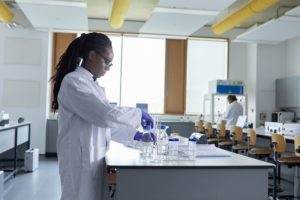Professor of Molecular Medicine
Faculty of Arts, Science and Technology
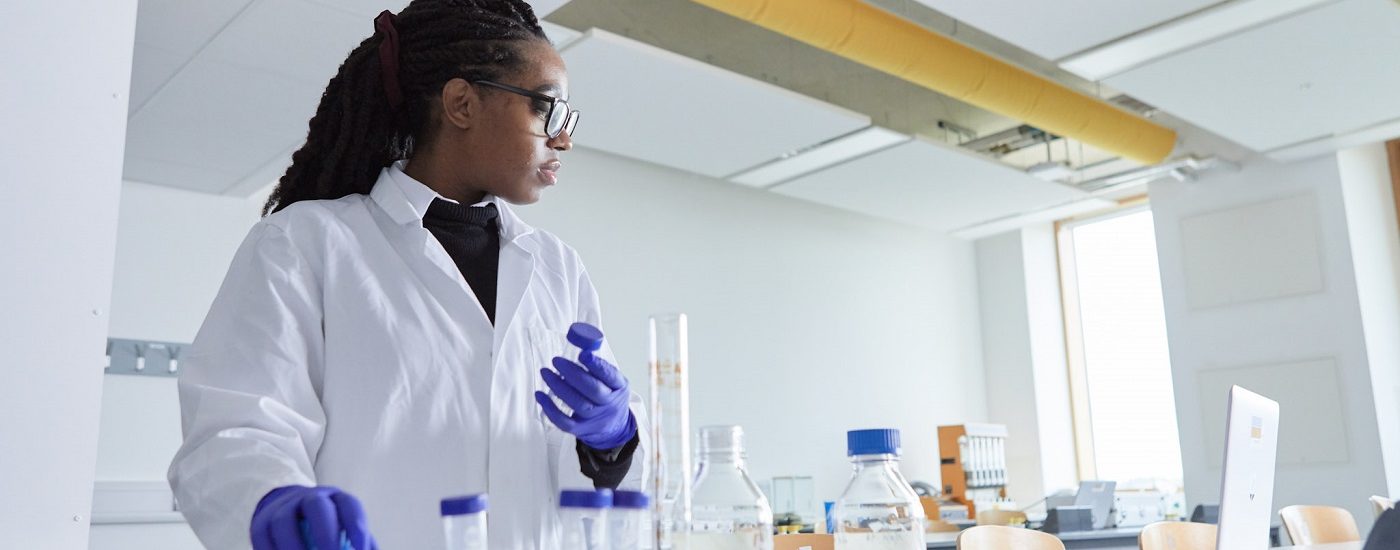
Biochemistry BSc (Hons)
- Home
- Courses by subject
- Biochemistry BSc (Hons)
Key Facts
-
UCAS Code
BSc: C700
BSc with Foundation: C701 -
Level
UndergraduateUG BSc (Hons)
-
Duration
Full Time: 3 years
Full Time Foundation: 4 years
Part Time: 4 - 6 years -
Starting
September
-
BCC at A Level or,
DMM at BTEC -
Full Time: £9,535
Part Time: £1,585 per 20 credit module
Integrated Foundation Year: £9,535 -
Full Time: £15,700
Integrated Foundation Year: £15,700 -
Waterside
Updated 28/03/2025
Updated 28/03/2025
Get in touch
For questions regarding study and admissions please contact us:
UK STUDENTS ENQUIRIES
study@northampton.ac.uk
0300 303 2772
INTERNATIONAL STUDENTS ENQUIRIES
Biochemistry underpins the very nature of our existence and acquiring skills and knowledge of this subject will help you solve key biological problems. Our Biochemistry university degree is aimed at helping you understand the interconnectedness of chemistry, physics and biology by exploring a range of different topics. This includes protein – protein interactions, recognising how macromolecular structure is closely linked to biological function and how this is perturbed in disease. You will find this BSc biochemistry course has a unique blend of biochemistry related topics including genetics, microbiology, physiology and chemistry. You can also specialise in more focused areas including thermodynamics, molecular geometry as well as medical and industrial applications of biochemistry.
Highlights
- Modules in emerging subjects such as bioinformatics
- Collaborate with international scientists from both academic and industrial backgrounds
- Modules with a large number of practicals to aid your learning and experience
- HP laptop and software included with this course for eligible students (see Eligibility criteria and terms and conditions).
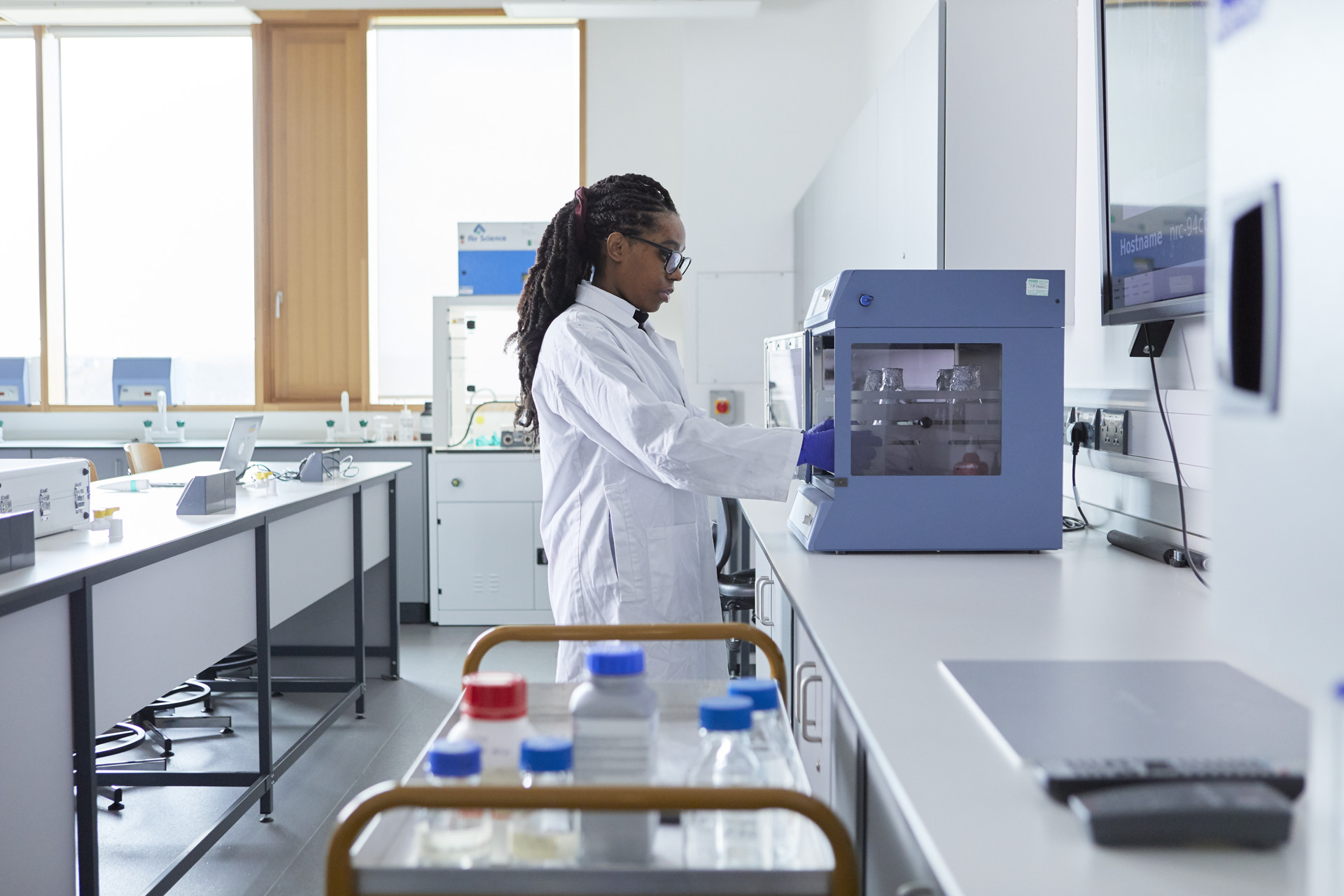
Student using the laboratory equipment in the science lab in the Creative Hub.
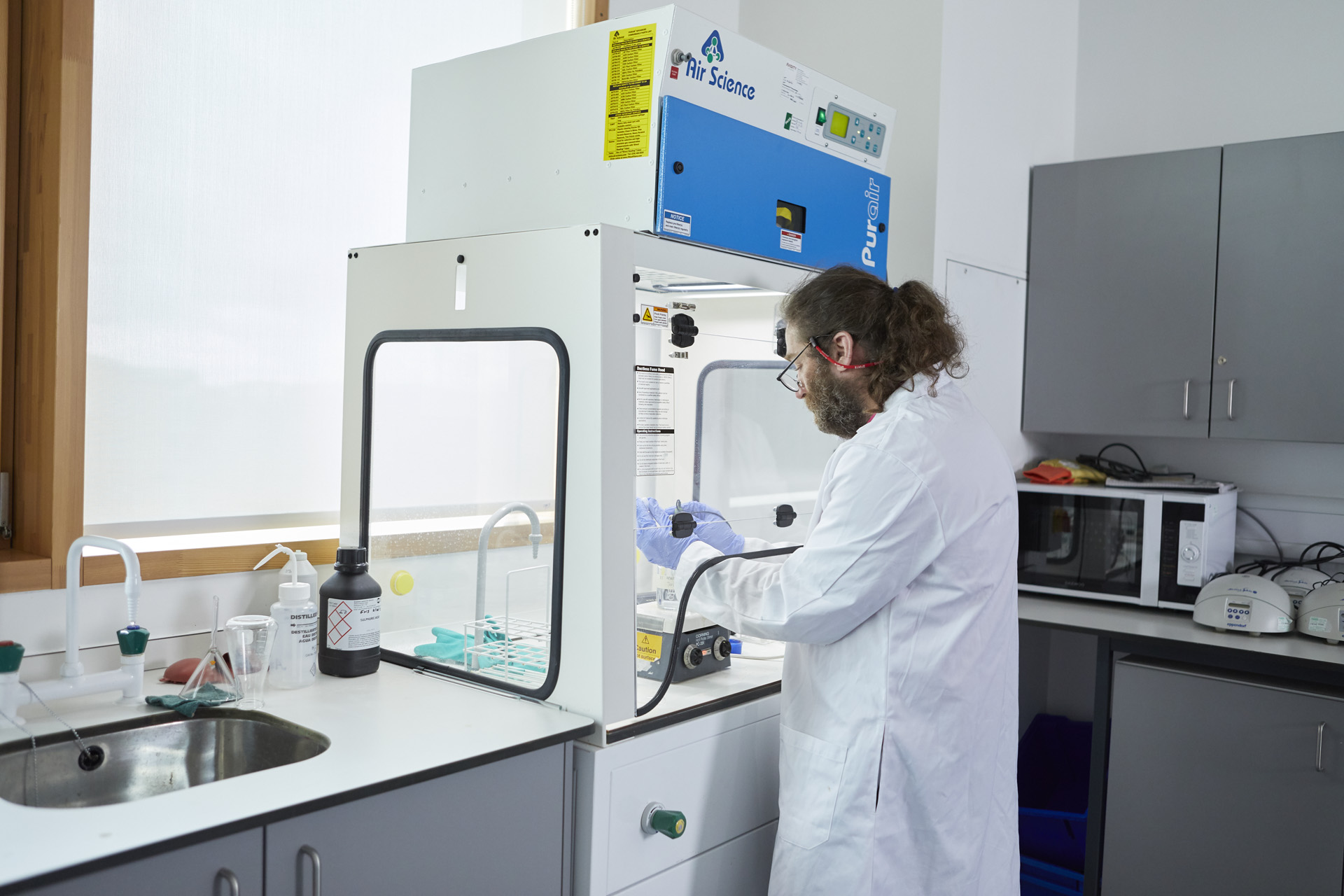
Student using a flame equipment in the science lab facilities at the Creative Hub.
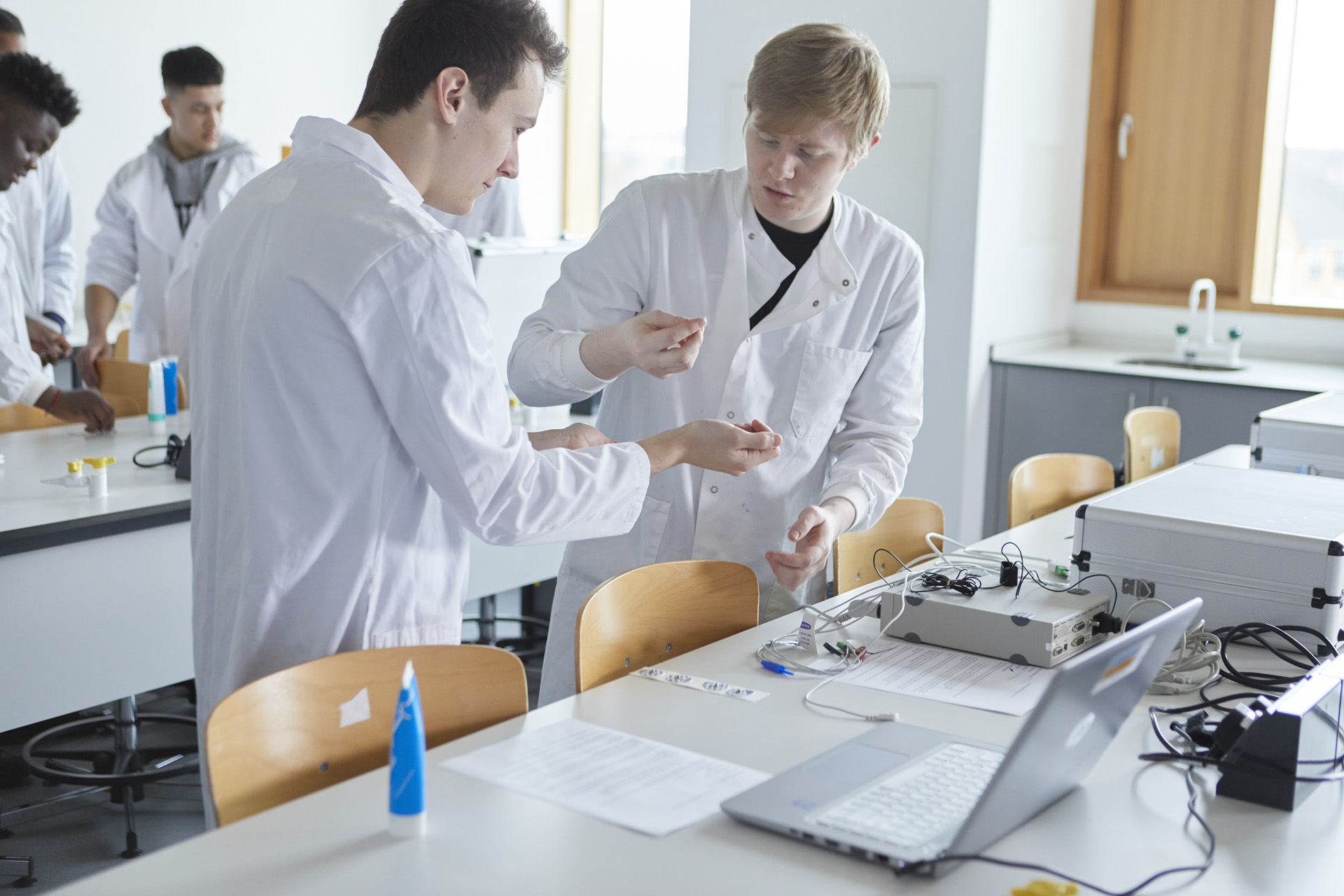
Two students undertaking an experiment in the Biomedical Sciences lab in the Creative Hub, during a seminar.
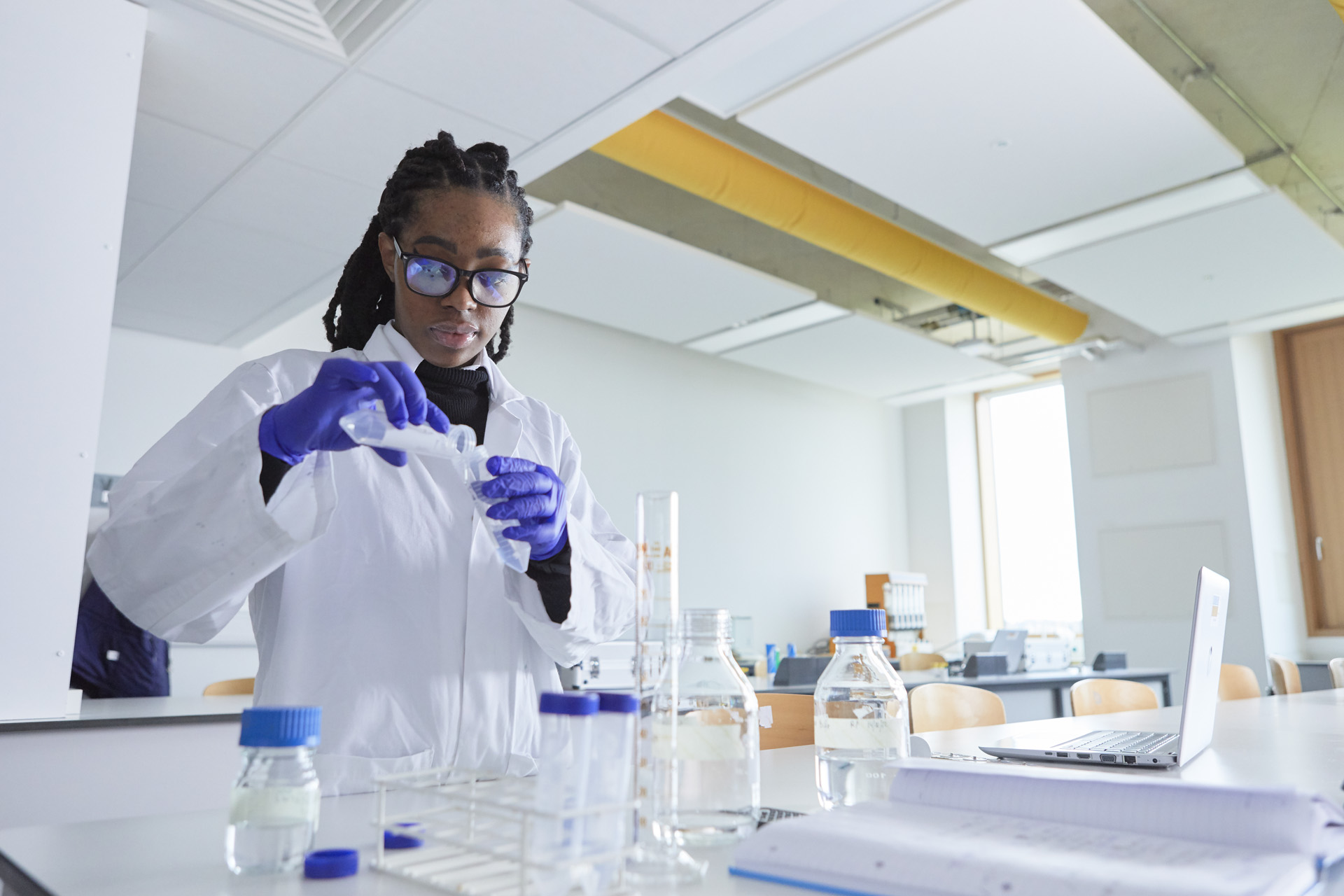
Student undertaking an experiment on a bench in the Biomedical Sciences lab, inside the Creative Hub.
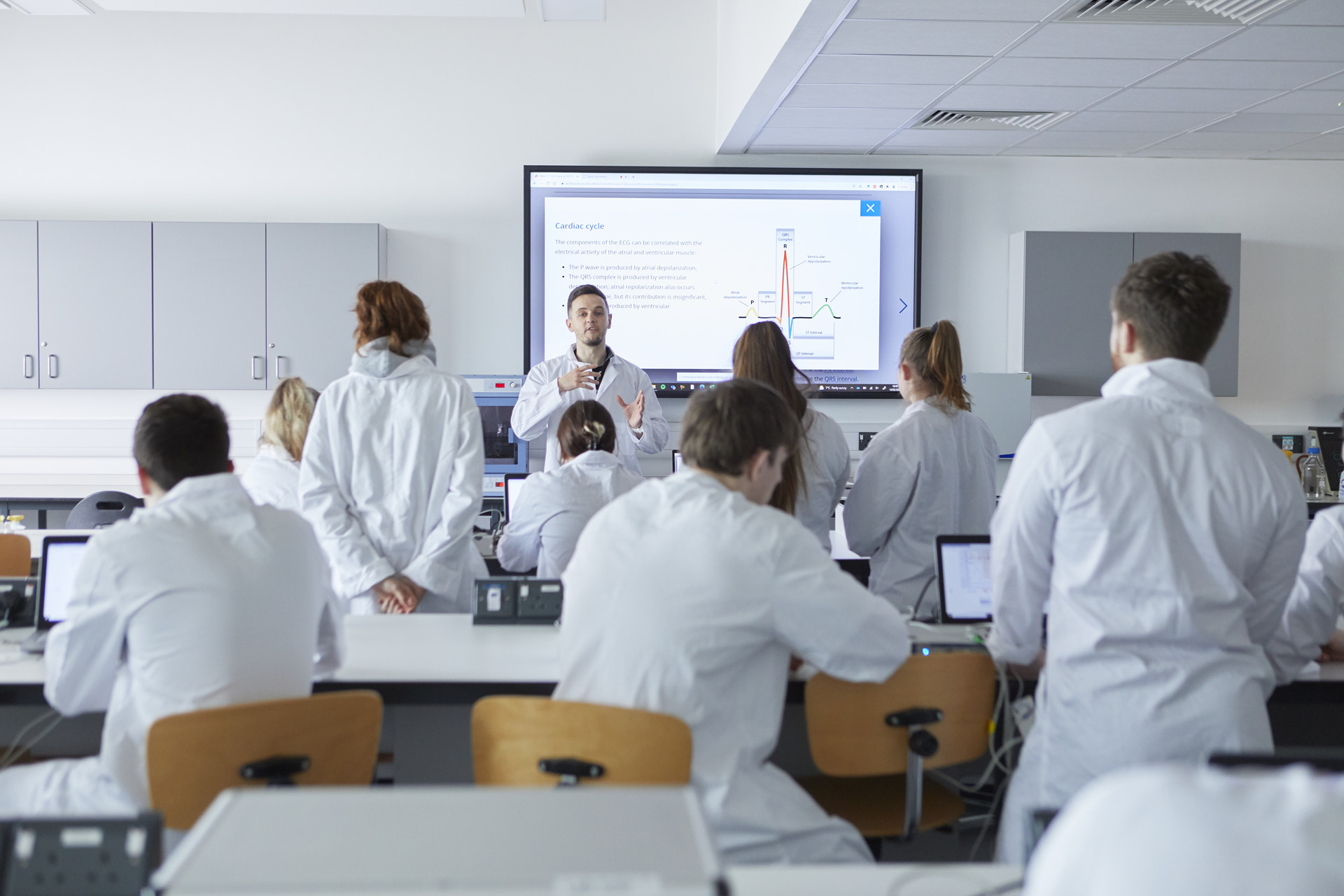
A science group seminar, where students are able to take part hands-on sessions.
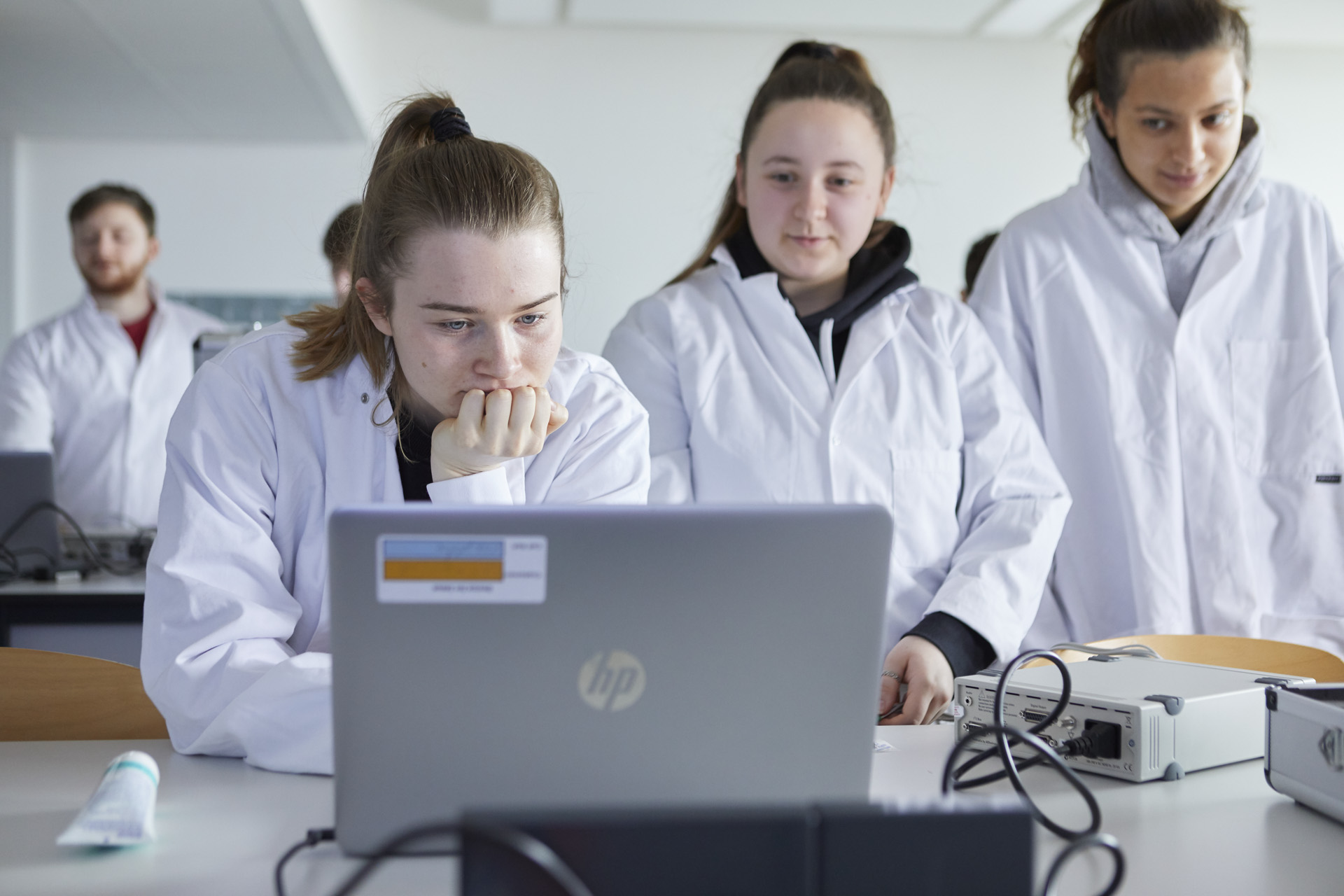
Three students at a bench in a Biomedical Sciences lab inside the Creative Hub, during a seminar.
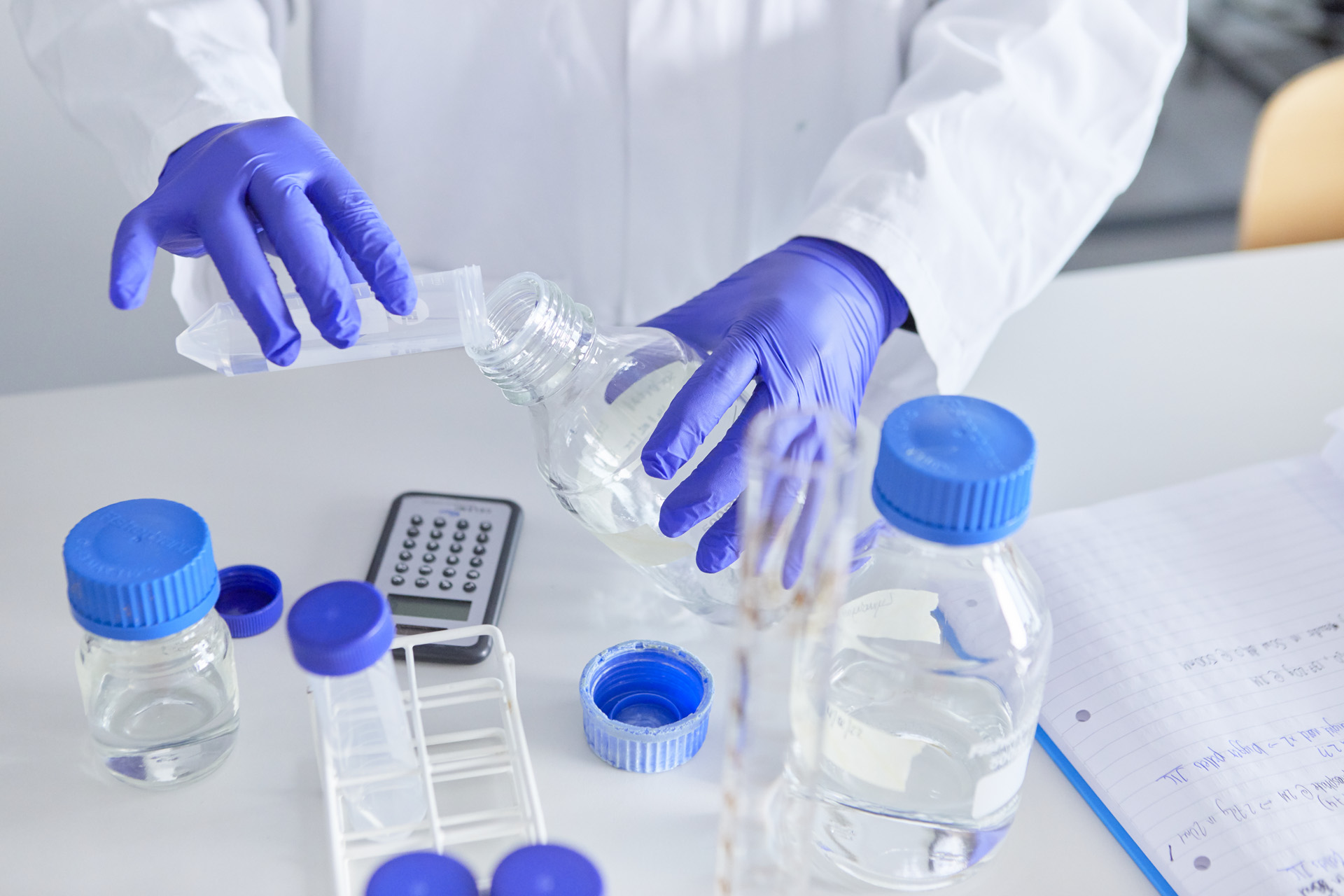
Example of the type of equipment students use within their science classes.

Students using equipment in science class in the Creative Hub Science Labs.

Student using the laboratory equipment in the science lab in the Creative Hub.

Student using a flame equipment in the science lab facilities at the Creative Hub.

Two students undertaking an experiment in the Biomedical Sciences lab in the Creative Hub, during a seminar.

Student undertaking an experiment on a bench in the Biomedical Sciences lab, inside the Creative Hub.
Entry Requirements
A typical offer for this BSc Biochemistry degree is:
- BCC at A Level or,
- DMM at BTEC or,
- Pass (C and above) at T Level
-
A level students are expected have studied at least two natural sciences at grade C or above, one of them must be chemistry while the accepted additional sciences include biology, maths and physics.
BTEC students must achieve a DMM grade at an extended diploma in either medical or forensic science. The BTEC must contain at least 2 units of chemistry.
We welcome international applicants and applications from students with a range of non-traditional educational or professional qualifications
For more information on how to make an application, please visit our How to Apply page.
-
Admission to the BSc Biochemistry with Foundation Year Programme is normally:
- DEE at A Level or,
- MPP at BTEC or,
- Pass (D or E) at T Level
In addition, you are expected to have studied a natural science subject (preferably Biology or Human Biology but Chemistry and Physics are also accepted) in an A Level at grade D, or equivalent qualification such as International Baccalaureate.
However, we would also like to hear from you if you have professional or industry experience instead, a range of other qualifications or self-developed subject knowledge that relates to the course you wish to study.
-
All International and EU students applying for a course with us must meet the following minimum English language requirements:
- IELTS 6.0 (or equivalent) with a minimum of 5.5 in all bands for study at undergraduate level
For information regarding English language requirements at the University, please see our IELTS page.
If you are an International student and would like information on making an application, please see our How to Apply page.
Upcoming Discovery Days
Discovery Days give you the best experience and insight to courses, people and facilities that interest you. Make your choice easier and come meet us.
Course Content
-
This degree in Biochemistry gives you a firm understanding of the underlying principles for biochemicals reactions that occur within living organisms. There are key biological themes that create the core of this degree that includes biochemistry, genetics and microbiology.
Year 1
At Level 4 of our biochemistry course, you explore a variety of biochemical aspects, such as, bond formation and dissociation, energy storage and transfer, and the structure and function of micro- and macro- molecules. You also develop your practical skills as a biochemist engaging in laboratory-based learning and work with qualitative and quantitative biochemical data.
Year 2
At level 5, our processes of life module provides a conceptual approach to biochemistry while the applied chemistry module offers a more mathematical understanding, allowing multiple perspectives of biochemistry. You undertake the bioinformatics module before you then begin to develop your research proposals for your final year dissertation project along with optional modules in genetics and microbiology.
Year 3
In the final year of this BSc biochemistry course, you will do an independent dissertation project supervised by an academic tutor. In addition, you can explore contemporary issues in biochemistry and how diagnostic tests are applied in clinical contexts. If you are particularly interested in genetics, you might follow a bespoke pathway. That could start with ‘genetics and molecular biology’ in the first year before advancing to ‘genes and genomics’ in the second year and then completing your final year with medical genetics. Our Microbiology theme includes ‘Introduction to microbiology’ in your first year, Techniques in molecular biology in your second year and then pathogen biology in your final year.
Please note the modules shown here relate to the academic year 24/25. The modules relating to the academic year 25/26 will be available from June 2025.
-
-
Biochemistry and Cell Biology (20 Credits)
Module code: SLS1013Status: CompulsoryThe purpose of this module is to give level 4 students an introduction to human biochemistry and cell biology. You will study the molecules and chemical processes that occur in living organisms, and explore the structure and function of cells, their components, and their interactions with the external environment.
-
Introduction to Microbiology (20 Credits)
Module code: SLS1019Status: CompulsoryThe purpose of this module is to provide an insight into how invading organisms can cause disease and relate human world health issues to populations. This module allows students to develop a broad understanding of infectious disease across the globe and the biology of the the causative agents, as well as examining intrinsic & extrinsic strategies to combat microbial pathogens.
-
Genetics and Molecular biology (20 Credits)
Module code: SLS1020Status: CompulsoryThe purpose of this module is to give you an introduction to genetics and molecular biology. You will learn about the fundamental mechanisms of DNA replication, transcription and translation. You will also explore how the tools of molecular biology, including cloning and PCR, allow the manipulation and understanding of genes and the proteins they encode.
-
Anatomy and Physiology (20 Credits)
Module code: SLS1035Status: CompulsoryThe purpose of this module is to provide an appropriate level of understanding of the anatomy and to introduce the student to the basic principles and concepts of physiology. Enabling an understanding of different body systems and how they are integrated to produce homeostasis.The focus will be on human anatomy & physiology and will study the form and functions of the major body systems.
-
Biochemical Skills (20 Credits)
Module code: SLS1050Status: CompulsoryThe purpose of this module is to introduce students to the laboratory practices best suited for the discipline of biochemistry. Students will study molecules and chemical interactions and how we identify them while applying this understanding to identifying disease.
-
Foundations of Chemistry (20 Credits)
Module code: SLS1051Status: CompulsoryThe purpose of this module is to provide level 4 students with an introduction to the fundamental chemical principles necessary to understand the chemistry of biological systems. The module will study organic, inorganic and physical chemistry. It will entail studying atomic and molecular structure and chemical interactions leading to a description of the reactivity of the function groups and reaction mechanisms that are found in biological systems and the fundamental forces that underpin chemical kinetics.
-
Biochemistry and Cell Biology (20 Credits)
-
-
Genes and Genomics (20 Credits)
Module code: SLS2001Status: DesignateThe sequencing of the human genome has enhanced our understanding of the genetic basis of disease and led to the emerging fields of both bioinformatics and genomics. This module will extend the students' appreciation of molecular biology learnt in SLS1020 while introducing students to both genomics and bioinformatics. The focus will be on applications of genomics to human disease, forensics and sports science.
-
Bioscience Research Methods (20 Credits)
Module code: SLS2013Status: CompulsoryThe purpose of this module is to develop knowledge and understanding of quantitative research methods, analysis and research skills within the context of human bioscience. The emphasis will be upon understanding and experiencing the entire research process from conception to presentation and developing the critical skills necessary to undertake an independent research project.
-
Processes of Life: Biochemistry (20 Credits)
Module code: SLS2016Status: CompulsoryThe purpose of this module is to give the student the opportunity to investigate the mechanisms underlying metabolic activities and physiological processes. By achieving the learning outcomes, this module aims to develop an understanding of biochemical regulation of the processes of life. Students will work toward securing the basic foundation needed to study all areas of biology, preparing them to undertake their independent research projects.
-
Principles of Pharmacology (20 Credits)
Module code: SLS2055Status: DesignateThe purpose of this module is to provide students with a grounding in pharmacology that will focus on basic mechanisms of drug action, e.g. how drugs interact with the body and understand how drug action is measured quantitatively.
-
Applied chemistry (20 Credits)
Module code: SLS2056Status: CompulsoryThis module provides students with the skills needed to identify the theory behind chemical and physical processes and how this understanding leads to breakthrough understandings in applied chemistry and biology. Students will be able to understand the need for mathematical importance on all biological systems.
-
Bioinformatics (20 Credits)
Module code: SLS2057Status: DesignateThe purpose of this module is to introduce students to bioinformatics and equip them with the ability to apply computational skills, knowledge and methods to analyse and interpret complex biological data.
-
Physiology 2 (20 Credits)
Module code: SLS2058Status: DesignateThis module emphasises the integration of sensory input and effector output that play a role in specific human behaviour. It also considers a range of human behaviours such as movement, emotion, sleep, addiction and stress, from a biological viewpoint. This module aims to help students develop skills in preparation for more independent learning in level six. To help students understand which biological systems are responsible for human behaviours and to allow students to develop and understand how body systems integrate to maintain homeostasis.
-
Molecular & Cellular Biology (20 Credits)
Module code: SLS2060Status: CompulsoryThe purpose of this module is to explore the way biological macromolecules interact to sense external and internal stimuli and transmit signals to effect responses by altering cellular processes. This will be examined at the molecular, cellular and systems level and students will gain an appreciation of the complexities of biochemical systems and an understanding of how to evaluate the techniques used to study them and the data that is generated.
-
Genes and Genomics (20 Credits)
-
-
Integrated Medical Genetics (20 Credits)
Module code: SLS3002Status: DesignateThe purpose of this module is to build on the understanding of material learnt in SLS2001. This will enable students to develop a deeper understanding of how genes behave both at the level of the individual and in populations. There will be an emphasis on linkage, association, and interaction of genes with other genes and the environment, and a discussion of how these factors influence complex traits and diseases.
-
Molecular and Cellular Neuroscience (20 Credits)
Module code: SLS3010Status: DesignateBuild on the knowledge of the CNS, neurophysiology and pharmacology studied in previous years. To develop an understanding of the molecular and cellular mechanisms underlying phenomenon such as neural plasticity and synaptic potentiation. To develop an understanding of the CNS in health and disease.
-
Clinical Biochemistry (20 Credits)
Module code: SLS3014Status: CompulsoryThe purpose of this module is to explore the ways in which the analysis of body fluids and tissues are critical to patient care and contribute significantly towards the diagnosis, treatment, monitoring and prognosis to most disease processes. A wide range of laboratory-based tests with relevance to clinical conditions will be covered.
-
Gene Regulation (20 Credits)
Module code: SLS3024Status: DesignateThe purpose of this module is to explore the complex mechanisms of genetic regulation in both eukaryotic and prokaryotic organisms and to gain an understanding of how changes in gene expression and RNA processing can impact phenotypes or behaviours. The module aims to develop students? ability to critically interpret and use research data and publications to form conclusions about gene regulation and RNA processing.
-
Medical Microbiology (20 Credits)
Module code: SLS3026Status: DesignateThe purpose of this module is to actively engage in current research on pathogens and understand the mechanisms used by pathogens to cause disease and impact on human health. The module will also focus on the challenges posed by infections with antimicrobial resistant microorganisms.
-
Work based learning (20 Credits)
Module code: SLS3040Status: DesignateThe purpose of this module is to develop students? laboratory skills in either a; medical, industrial or research setting in order to gain confidence in the highly transferable skills which lead to increased employment potential.
-
Contemporary Issues in Biochemistry (20 Credits)
Module code: SLS3041Status: CompulsoryThe purpose of this module is to empower students with the understanding of key issues that biochemists face in today?s society through the critical exploration of issues such as pandemics, epidemics, testingoutbreak variants and future concerns.
-
Biochemistry Dissertation (40 Credits)
Module code: SLS4013Status: CompulsoryThis module allows the student to formulate a research question and undertake independent research in a chosen topic area of Biochemistry.
-
Integrated Medical Genetics (20 Credits)
-
-
Application for accreditation to the Royal Society of Biology is in process.
-
At the University of Northampton, everything we do, from funded trips to paid internships, is to give you everything you need to make a difference when you leave.
If you join our full-time Biochemistry degree at Northampton, you will receive a laptop when your course begins*. The laptops are built to a bespoke custom specification ideal for use in the seminar room, collaborative group work or studying at home.
Whatever your ambitions, we’re here to help you to achieve them. We’ll support you to identify the skills you’re learning during your biochemistry course, find your strengths and secure practical experience so that when it comes to applying for jobs or further study you’ll feel confident in standing out from the crowd. We’ve created the Northampton Employment Promise because we are so confident that if you focus on your studies and complete one of our awards you’ll be highly employable by the time you graduate. Putting you in a great position to secure employment or continue your studies.
To check out the full list of perks, visit our Student Perks page or dedicated International Perks page.
*UK fee payers only (see Terms and Conditions for further details).
-
The Integrated Foundation Year (IFY) offers a new and exciting route into studying for our biochemistry degree, attracting ambitious and driven students who are willing to learn and advance.
If you have non-standard qualifications or do not quite meet the admissions requirements, we can offer you a fantastic opportunity to study a four year programme which includes an Integrated Foundation Year. The Integrated Foundation Year will help you develop the theoretical/practical and academic skills you need, in order to successfully progress to the full award.
Our four year courses will enable you to successfully follow the degree pathway of your choice while gaining essential study skills. The foundation year of your chosen degree will be studied on a full-time basis and is aimed at supporting the transition to higher education. Years two, three and four are then studied as a standard degree programme.
-
A full, one academic ‘sandwich’ year is available to students between the second and third year modules. Staff can help you ascertain placements either; locally, nationally or even globally through their connections.
There is also an optional 20 credit placement module in the final year. This module spans both first and second semesters and is ideal for a local placement, gaining experience without adding an extra year to your studies.
-
How will I be taught?
You will be taught in a variety of ways on this biochemistry degree; traditional face to face small seminars, online sessions through our virtual classroom, asynchronously and through additional support sessions.
How many hours per week of teaching/ personal tutoring?
You will typically have between 12-14 hours of taught content and an additional hour available with your designated tutor.
How will I be assessed?
Each of the 6 modules you study each year will have 2 items of assessment (essentially 12 assessment items each year). These range from; essays, posters, presentations, blogs, graded practical sessions, time constrained essays and exams.
What jobs can I go into from studying this BSc Biochemistry course?
Many graduates of the hard sciences tend to stay in the field, many go on to consider MSc or PhD, work for the NHS, laboratories, pharmaceutical industries and the education sector.
Worried about student finance?
Get all the info you need ahead of time, before you can apply for funding in Spring on our fees and funding pages.
Fees and Funding
2025/26 Tuition Fees
- UK – Full Time: £9,535
- UK – Part Time: £1,585 per 20 credit module
- UK – Integrated Foundation Year: £9,535
- International – Full Time: £15,700
- International – Integrated Foundation Year: £15,700
Fees quoted relate to study in the Academic Year 2025/26 only and may be subject to inflationary increases in future years. UON will adjust UK fees annually in line with Government Policy.
-
There are no additional costs for this biochemistry degree for students beginning their studies in September 2024. Should this change, applicants and students will be contacted by the university with details of the costs.
-
Fees quoted relate to study in the Academic Year 24/25 only and may be subject to inflationary increases in future years.
- UK – Full Time: £9,250
- UK – Part Time: £1,540 per 20 credit module
- UK – Integrated Foundation Year: £9,250
- International – Full Time: £15,200
- International – Integrated Foundation Year: £15,200
Careers and Employability
This BSc Biochemistry course will open up a range of career opportunities, including:
- NHS
- Biochemist
- Mathematician
- Drug Design
- Pharmacology
- Medical School
Facilities
The University of Northampton boasts a new £330 million campus with state of the art facilities. In the Creative Hub, you will find a well-equipped teaching laboratory with three additional laboratories for research and dissertation projects covering genetics, tissue culture and microbiology. You will also have the Learning Hub and Senate to aid you in your studies, but as a Biochemistry student, you will also have access to the Institute of Creative Leather Technologies which has exceptional chemistry facilities.
Related Courses
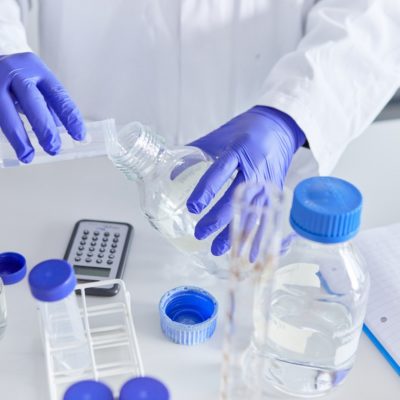
Biomedical Science BSc (Hons)
Our Biomedical Science degree is designed to equip you with a fundamental understanding of how science...

Biological Sciences BSc (Hons)
Biological Sciences BSc (Hons) develops your scientific skills and knowledge to understand the interaction between biological...
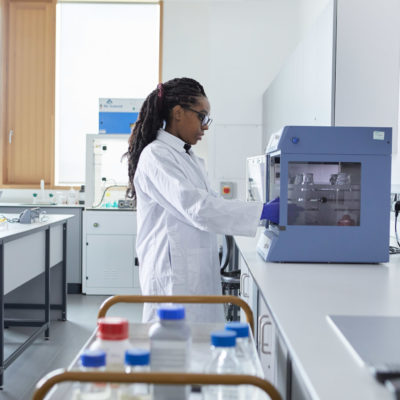
Pharmacology BSc (Hons)
On Pharmacology BSc (Hons) you will learn how drugs are made into medicines. How drugs and...
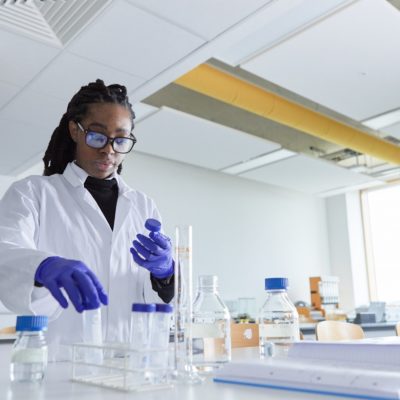
Molecular Medicine MSc
Our Molecular Medicine masters enables you to focus on molecular medicine, genetics and genomics.
73%say staff value students views and opinions about the course
Data for courses in Biosciences over two years at The University of Northampton
93%of students say teaching staff have supported their learning well.
Data for courses in Biosciences over two years at The University of Northampton
80%in work or doing further study 15 months after the course.
Data for courses in Biosciences at The University of Northampton








